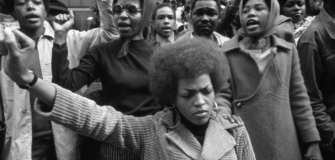Saartjie Baartman: Reclaiming Our Bodies
Share
The story of Saartjie Baartman, known as the Hottentot Venus, is an account of the historical and continued trauma directed at the bodies of Black Women.
Saartjie was kidnapped from South Africa and displayed throughout Europe, nude and exploited for the amusement of her oppressors, until her death at the young age of 26. Even after her death, her remains were desecrated and housed at the Musée de l’Homme (Museum of Man), in France, unable to rest until Nelson Mandela fought for her return to Eastern Cape, South Africa in 2002.
From the moment I was educated about Saartjie I’ve remained angrily curious about her inner thoughts as she struggled to survive and maintain the sacredness of her body and culture in the midst of a society lacking reverence for either. I imagine there were days she stared out and past the ignorant faces of circus patrons and cruel racists as they wrinkled their noses, disgusted by the ample and dark flesh she was forced to display. I imagine her eyes grazed the tops of their heads fixed on the horizon she once shared with her people, the Gonaquasub of the Khoikhoi. She may have even drowned out their inhumane remarks with the memory of her husband’s drumming to lessen the impact of the hate awaiting her each morning.
Still, I know there were days when she caved beneath the weight of it all. The kidnapping; the sexual violence of her body being displayed as a novelty for pale-faced strangers; the mistreatment at the hands of men who claimed to own her, as though such a thing were possible. I see those days reflected in the eyes of the women I meet in sacred healing circles when I ask them, “When is the last time you looked at yourself naked?”
The question alone is a violation. Shoulders raise with tension and eyes wander around the room with a mixture of shame, embarrassment, and curiosity. We are a circle of Saartjie’s sisters. We know what it feels like to be on display. We are aware that our bodies aren’t mainstream media material, our hair is non-compliant in its natural form, and our curves are only attractive when they exist within the confines of whiteness. Like our sister, we cannot escape the crinkled expressions and mean-spirited comments. On the days we do, we still have to face the voices planted in our heads, encouraging us to question our beauty at every turn.
The narrative we have been sold depicts our black bodies as commodities for mass consumption and actively denies humanity our skin embraces. This gross distortion of our personhood deters black women from reclaiming ownership of our unapologetic nakedness and all of the delicious aspects of what it means to be human, complex, and feminine. We value the utility of the vessels we inhabit, but remain so disconnected from them we can’t feel the pains in our wombs or the weakening of our overworked hearts. Pleasure is viewed as a luxury we can’t afford rather than a birthright we can claim at any time. Saartjie’s story is one of many used to reinforce the idea we are safer covered up and our bodies carry too many scars to be celebrated as sensual, beautiful, and worthy of adoration; but I refuse to allow her to be exploited in death as she as in life.
I reclaim Saartjie’s story, and in doing so, I reclaim our right to the pleasure of our bodies. I use my sister’s story to ease the minds of her descendants by welcoming them to my fantasy; the one about Saartjie’s best days. The days when she stares every one of her spectators in the eye bearing her tribal markings, beads, paint, or whatever made her feel like the fierce deity she was born to be. I ask the women around me to close their eyes, to notice as a smirk crosses over Saartjie’s face and the onlookers begin to step back nervously. Then I tell them the best part.
Imagine we are right there beside her. What have you chosen to adorn your body with – like Saartjie?
Some say waistbeads, others say tattoos, all participate. We are all there now, with Saartjie on her best day, and reminded that her spirit is with us on our worst.
When they open their eyes the shame has lifted. In its place, there is a new spark with a hint of Saartjie’s smirk. We have reclaimed what is rightfully ours to adorn and enjoy: Our naked bodies and all of the sacred power they can hold.




Follow Us